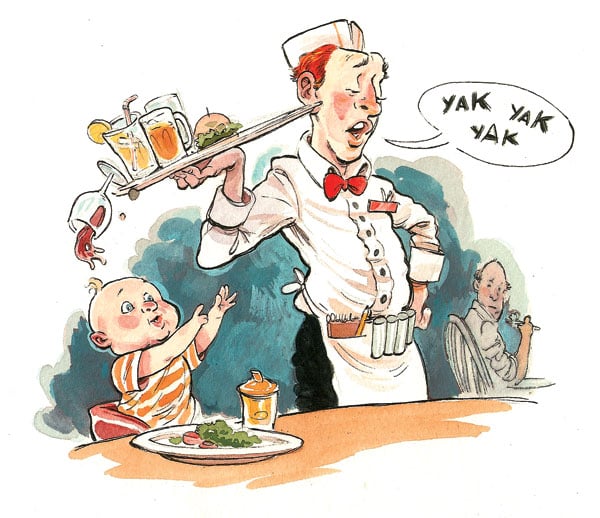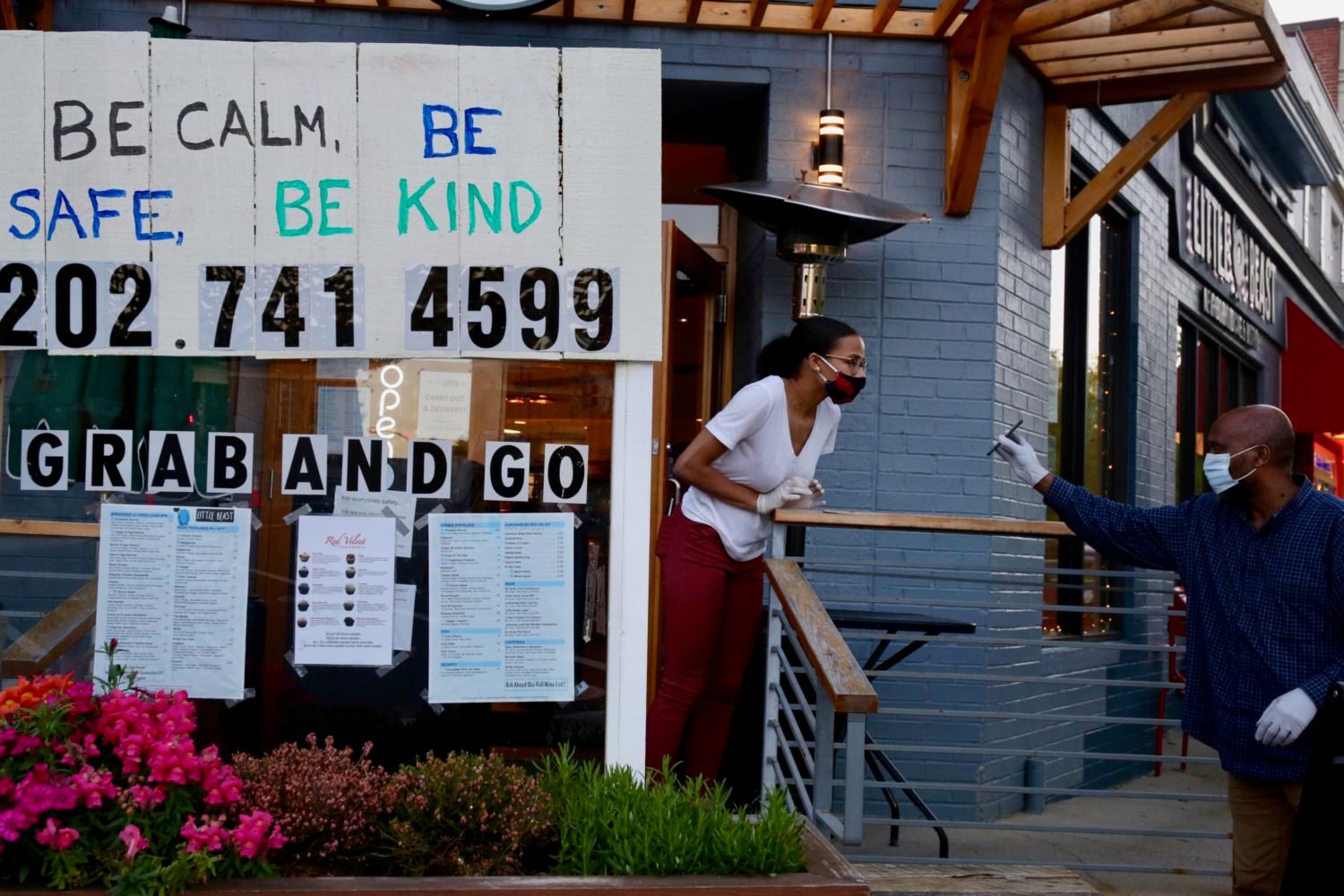
My wife laid down certain rules after that: In a high chair by 6 at the latest. If traffic is bad and we have to bail, so be it.
Dinner became something to prepare for twice.
There were the preparations I needed to make for him and the preparations I needed to make for me, to ensure that my stealth mission–my anonymous visit to a restaurant as a critic–came off without a hitch.
Afternoons usually went like this:
Make a reservation under an assumed name–my nom de mange, I like to call it. E-mail my wife to be ready to leave the house at the appointed time. Choose all of the dishes we’d order. E-mail our guests the “rules” for the night: what can and can’t be talked about at the table, when and how to pass plates so that I’m able to sample each dish, how to quiz the waitstaff about the Syrah and the veal without lapsing into an SS-style interrogation.
At the same time:
Load his bag with necessities–change of clothes, diapers, sippy cup. Choose an assortment of books along with crayons and paper. Fill and pack Tupperware containers with Cheez-Its, Cheerios, and animal crackers while relishing the irony of sneaking cheap processed food into a restaurant that charges $16 for a glass of wine.
Sometimes I prepared in vain.
One night as we were nearing the restaurant, I glanced into the rearview mirror. There he was, a limp pile of limbs.
“What should we do now?” I asked.
The look on my wife’s face said: Tell me that’s a rhetorical question.
We’d already taken him out three nights in a row. If it were just any restaurant, I said, I’d understand. But this was Important Restaurant X. I’d been waiting five weeks to get in. I proposed we give it 15 minutes, that maybe he’d wake up then and we could have our meal. I drove around the block three times.
He did not wake up.
Five more minutes, I said.
“No,” she said, peeved that I’d thought to push through.
My son, if he’d known I had put my needs as a critic above his, would probably have been peeved, too.
The hostess professed understanding when I called to cancel five minutes after we were supposed to be there, but her blithe, sing-songy tone oozed the opposite. It was all peeve.
As for me, I had left peeved and was approaching pissed. Dinner at Important Restaurant X turned out to be takeout pizza from Chain Restaurant Y. It was cold by the time we got it home.
It was rare that we missed a meal. But there were many I wished we had.
One night when Jesse was almost two, we were at an Italian restaurant in Alexandria. The waitress was excellent, and we put in orders for drinks and appetizers. All was well until my son dropped his fork.
How did he know this wasn’t his fork? He just knew.

He was inconsolable.
“It’s okay,” I said, “they’ll get you a new one.”
You would have thought a stranger had snatched his Elmo doll. Tears streamed down his pinched red face.
I handed him my fork.
No. He wanted his fork.
How did he know this wasn’t his fork? He just knew.
The stares were coming from every corner of the restaurant as he wailed.
It dawned on me: I’ve become the diner I used to despise.
I once shot dirty looks at tables with kids who wouldn’t pipe down. I never thought twice about asking to be moved to another table, away from the offending baby.
Now I always found myself scanning the room for tables with small children, curious to know how their dinner was going. Reading online reviews, with their frequent, raging criticism of parents who brought young children to restaurants, made me cringe. “Who do these arrogant, entitled yuppie assholes think they are?” went a typical review on Yelp. “What makes them think their oh-so-precious princes and princesses are welcome at every goddamn restaurant in the city?”
My wife, at the limit of her frustration, gathered Jesse up and took him outside.
Ten minutes later, he returned . . . and remembered why he’d been so upset.
“My fork!” he cried.
He and my wife spent the remainder of the meal outside while I ate parts of two appetizers, three entrées, and two salads.
In American culture, there are restaurants for adults and there are restaurants for kids, and the two are not expected to mix.
It’s different at Latin and Asian restaurants, where no such divide seems to exist.
The first time I took Jesse to a roadside joint in Bladensburg’s Little Mexico–he was probably six months old–the waitress fussed over him for a minute or two before extending her arms like a forgotten aunt.
The expression on my wife’s face was priceless: diplomacy vying with primal anxiety. You want me to hand over my baby? But she relented. The waitress scooped him up, cuddled him, cooed over him–and whisked him out of the dining room.
Now my wife’s alarm was palpable.
We found our waitress in the kitchen, parading Jesse around as the cooks entertained him with their shiny tools.
Even better was the restaurant in Annandale’s Koreatown where the co-owner descended on our table as if she were his bub-bub and hadn’t seen him in weeks. She took him to a nearby table where her staff was chopping vegetables. For the next 20 minutes, she bounced him on her knee and dangled scallions in front of him as if they were car keys, entreating us to seize the chance to eat in quiet, just the two of us.
These were among the most extraordinary restaurant experiences I’ve ever had. Not only was our son showered with affection, but we were made to feel like part of an extended family. We were being embraced, too.
By contrast, whenever I walked into an American restaurant with him in those first two years, there was seldom a smile, much less an embrace. My son was a problem to be solved.
“You can’t bring that in here,” the general manager of a popular restaurant commanded us one afternoon.
We think he was referring to the stroller.
Next: Things were harder without my wife there–like being-denied-the-use-of-my-limbs harder.


















